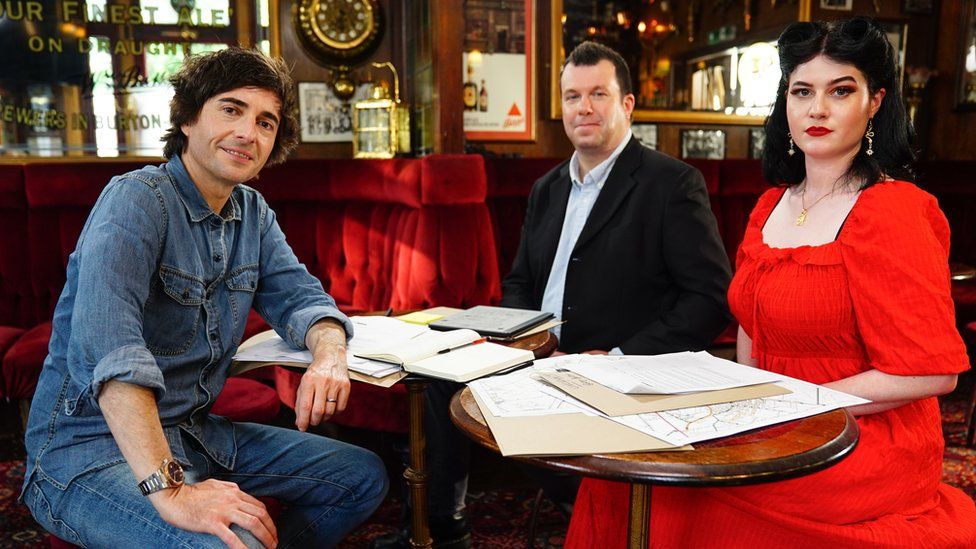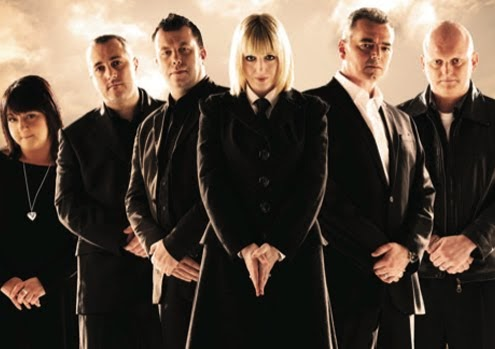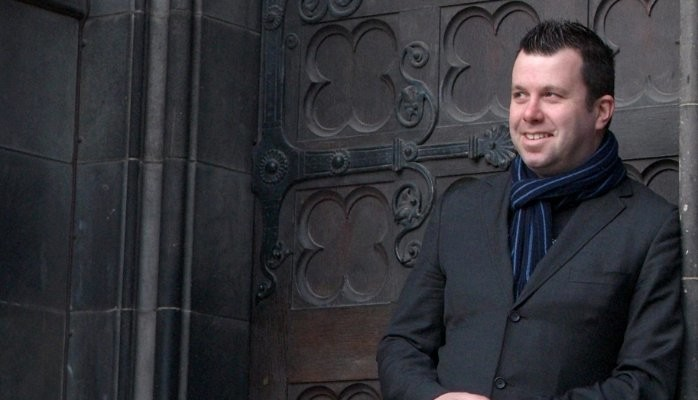INTERVIEW BY FIONA DODWELL
Dr Ciaran O’ Keeffe is a respected British parapsychologist who starred in hit TV series Most Haunted as the resident sceptic, as well as being a regular guest on Danny Robins’ popular podcast series, Uncanny. Head of School of Human and Social Sciences at Buckinghamshire New University, Ciaran is also fascinated by the paranormal.
He studies haunting experiences and also specialises in subjects such as Demonology and Exorcism. Having learned about these subjects from Ciaran himself over the years, I was eager to invite him for an interview to discuss his views, experiences, and what it’s like working with Danny Robins on tour...
Can you begin by sharing when your interest in the paranormal began?
I’ve always been fascinated by the paranormal. As a young boy I was a voracious reader of ghost and horror stories – my shelves were filled with authors such as H.P Lovecraft, M.R. James, Edgar Allan Poe and contemporary short story writers such as Stephen King and Clive Barker. As a curious 9-year old, I was also enthralled by Arthur C. Clarke’s Mysterious World and was an avid (secret) viewer of horror movies in the early 80s (Amityville Horror, Legend of Hell House, The Exorcist etc. Probably movies I should not have been watching at that age!). This early fascination culminated in Ghostbusters coming out in 1984 (aged 13). I saw it and thought “That’s what I want to do!”
It resulted in a motivated mission to study Parapsychology at University (not easy to achieve) and so I did an undergraduate Psychology degree in the USA where my Dissertation was supervised by a Parapsychologist from the Institute of Parapsychology (Rhine Research Center) in Durham, NC where Parapsychology started over 80 years ago!
Have you ever had experiences of your own which are hard to explain away via conventional methods?
No. Simple answer, though a need for clarification. I rarely “explain away” experiences of others as I wasn’t there. It is all about offering alternative explanations, perspectives. The same with my own experiences – I am aware of the alternative explanations and so tend to consider them with my own experiences. I recognise, for example, that an experience in the haunted ship, SS Great Britain (in Bristol), where I felt “spooked” could be down to a number of reasons (suggestion, infrasound etc.).
You’re known as a sceptic in the paranormal world. It’s quite a limiting term. How would YOU describe your attitude to the paranormal?
I’m based at Buckinghamshire New University where I am Head of School of Human & Social Sciences – but I also have experience and qualifications as a Psychologist (and, therefore, I have a scientific background and outlook). So, absolutely I’m a sceptic and I truly think it is the best place to be! Note, the word “skeptic” or “sceptic” comes from the Greek word “skepsis” meaning investigation. It also means open minded but questioning etc. I like to describe my attitude to the paranormal as being a pyrrhonist sceptic which advocates suspension of judgement. There are various subdivided forms of pyrrhonism – ephectic (suspending judgement); aporetic (engaged in refutation); zetetic (engaged in seeking) – and I think I am all of them. Key to true sceptism though, is ensuring you are not tarnished with the “cynicism” brush! I am not a cynic, I am open-minded to the possibility. It would be pretty weird for a teenage boy obsessed with Ghostbusters to carve out a career for himself investigating ghosts thinking one day there won’t be a phone call and he’s able to say “We’ve got one!”.
Several years back you worked on the TV series Most Haunted. How was that experience?
It was fantastic! To be part of such an iconic show was a privilege and I’m grateful for the opportunity. Over the years I was with the team, I got to visit some of the most amazing locations worldwide, spoke to some fascinating people who recounted their ghost stories and also witnessed, first-hand, individuals having haunting experiences. I was a Parapsychologist (and Investigative Psychologist) before the show but Most Haunted has given me some amazing opportunities since – access to haunted locations; meeting some wonderful people (many of whom I still call friends); to participate in media since (TV, podcasts, news reporting etc.). If it wasn’t for Most Haunted I might never have met Danny!

You’re a regular guest on Danny Robins’ hit podcast, Uncanny. How did you become involved?
I’ve known Danny for over 15 years. We first worked together on a BBC3 show back in 2007, The Bulls*t Detective. One episode involved the “testing of mediums” which was a key aspect in my PhD. Although in my PhD I focused on laboratory testing, there were some principles that could be applied to field testing. Danny brought me in to help test mediums and the result was a rather amusing episode: https://www.youtube.com/watch?v=QZ3LyZyiBSA
Following this initial collaboration we kept in touch and I contributed to Danny’s “Haunted” podcast and also, for his 2:22 research I talked with him about the skeptic-believer relationship I’ve had with my wife since we first met (she’s a believer, I’m the skeptic!). Over the pandemic he invited me to get involved in investigating the Battersea Poltergeist…and the rest is history!
Will you be joining him on the upcoming live Uncanny tour dates?
By the time this interview comes out we’ll be in the midst of the 2nd leg of the tour and so audience members will have seen me on stage for a handful of the dates! It is yet another fantastic branch to the Uncanny tree! We cover new cases in an exciting live format with the usual debate between experts that fans of the podcast have come to love. But the podcast’s transfer to the live stage means the visual adventure and audience witnessing dramatic moments and phenomena on stage…and so the answer is “yes”!
How do you think ghost hunting reality TV shows have impacted the study of the paranormal? Have they had a positive or negative impact?
Both. The positives are the explosion of interest in ghosthunting and all manner of paranormal investigations. Additionally, the positives include us talking, and the voracious appetite for ghost shows (including podcasts!) that are not the standard fare of ghosthunting involving teams screaming and getting scared at noises. I have always been a Parapsychologist but if it weren’t for the ghosthunting reality shows, I’d still be doing my research in the lab and no-one would potentially hear about my viewpoint, my research etc. beyond academic and scientific circles so I do see the positive there. The negative is the modelling of behaviour seen in some of these shows – if the viewing audience think proper ghosthunting is what is portrayed on the television then they go out and ghosthunt themselves but copy the approaches used on television then it is a negative. I’m a big crusader for #ParaEthics and the majority of ghosthunting reality TV shows display unethical practices. The influence these shows have, therefore, is a negative.

Do you think alleged ghost hunting gadgets (such as EVP recorders and EMF devices) are valid ways to attempt to produce evidence?
Not necessarily but it depends what the ghosthunter is after. It would be arrogant of me to say there is one way to ghost hunt. I have a particular approach I take but others prefer a more spiritualist approach. Others prefer to use ghosthunting gadgets and that’s fine if they’re hoping to capture “evidence” of that sort but please do not say the use of such devices is a scientific approach to ghosthunting. Some of these gadgets have been designed specifically with ghosthunting in mind and yet we do not actually know what ghosts are so how can you develop a “ghost detector” and capture evidence? Similarly, the EMF Meter is often used as a ghost detector but without knowing why. Some ghosthunters thing a ghost interferes with EMF – but there is no evidence for this. There is actually more evidence for the use of EMF Meters to detect natural explanations for people’s experiences. The work of Persinger, for example, gives us a reason to look at EMF (or GMF) and to understand how it may affect the brain and physiology in such a way that it could create sensations (and in some cases hallucinations) that are misinterpreted as being ghostly. Using an EMF Meter (an appropriate one) to detect these particular fields that have these effects is a more interesting line of enquiry (from my perspective anyway).
What have you found to be the biggest challenges involved in the field of paranormal study?
Firstly, a key frustrating challenge is the spontaneous nature of haunting experiences. Even in places where there are repeated, consistent experiences reported, there still isn’t the daily consistency so it is difficult to predict when it will happen. Therefore, where (and when) do you point the camera? How long do you stand or sit in a particular place waiting for phenomena to happen? Etc. etc. It is why an ideal, and better, ghost investigation could last months and even years.
Secondly, the often elusive nature of parapsychological phenomena in the lab (telepathy, precognition, clairvoyance, psychokinesis) and the depth of highly impactful anecdotal experiences relayed convincingly by eyewitnesses.
Thirdly, #ParaEthics – a challenge to change the culture, to change the thinking of those who are unethical.
Fourthly, education of ghosthunters – education is a passion of mine and I enjoy education people about the reality behind ghost gadgets and the science behind explanations. Danny has afforded me an amazing opportunity to help with that education (as Most Haunted did previously). I’m also lucky to have been able to spread the word through magazine articles and journal articles etc. The challenge, though, has been the reticence of some to not be interested in learning, learning about the science, learning about the past (for example, Harry Price), learning about the amazing guides and lectures and workshops put on by organisations such as The Society for Psychical Research or ASSAP.
Lastly, tiredness. When it’s 3am and you’ve spent the day working and then go out for a ghost hunt overnight and you’ve had to deal with a number of adrenalin-fuelled moments (or maybe none at all), it is tough to keep the energy levels up. Especially when, as a Parapsychologist, you’re aware of how your perception can be influenced by various substances typically used to keep you awake – energy drinks, chocolate, caffeine – substances you, therefore, tend to avoid!

Finally, are you working on any upcoming projects you can share with us?
Looking forward to Uncanny Series 2 (BBCTV). Currently working on a number of writing projects – a collaborative scientific research article on a viable neurological explanation for a number of demonic possession cases; an accessible Parapsychology text or, maybe first, an accessible book about haunting sceptical theories (that I constantly put forward!); a chapter in an academic book on the empirical parallels between subjective paranormal (and largely haunting) episodes and gangstalking accounts; a book on Religious Parapsychology with a particular focus on my field research into “Miracle Blood”; I keep being asked about my biography too…one day!
Thank you, Ciaran!
CATCH THE UNCANNY TOUR BY CLICKING HERE
